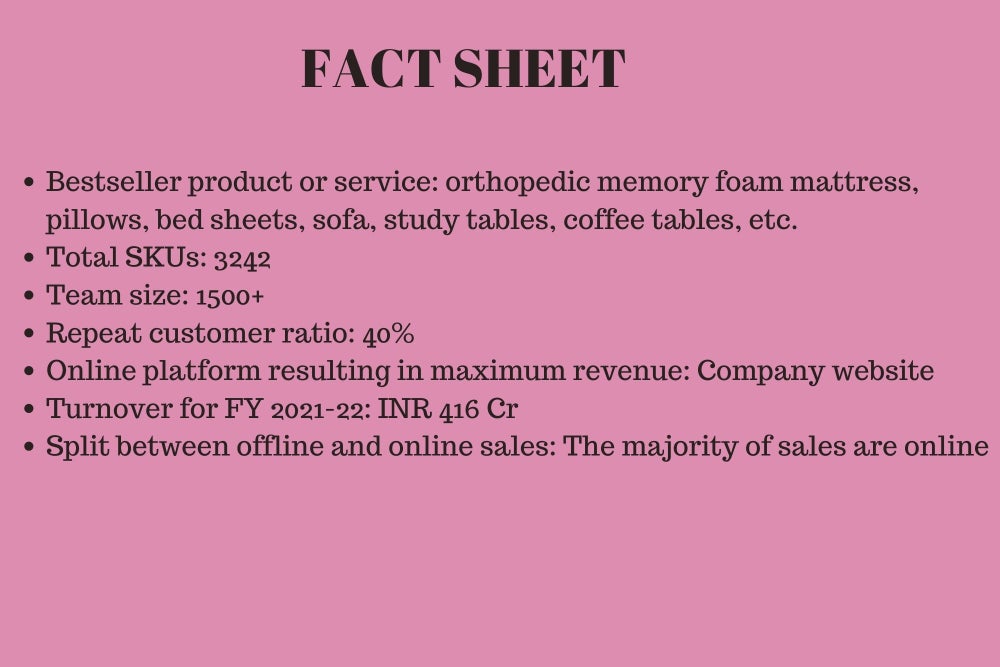Making Dreams Come True During Wakefit's initial years of operation, the primary challenge was to build customer trust since selling mattresses and sleep solutions online was a new concept
By S Shanthi
Opinions expressed by Entrepreneur contributors are their own.
You're reading Entrepreneur India, an international franchise of Entrepreneur Media.

For Ankit Garg, CEO and co-founder, Wakefit, the drive to build a digital-first brand emerged due to his and his co-founder Chaitanya Ramalingegowda's inherent passion and need for innovation. Across the then-nascent D2C sleep solutions market, they noticed a gap and determined the possibility of creating solutions that emphasized the holistic science of sleep.
The D2C business model allowed them to directly sell to their buyers, thereby increasing accessibility and controlling costs. This inspired them to revolutionize the way Indians accessed home and sleep solutions in the country.
Before officially incorporating Wakefit, Garg bought a few hundred mattresses and sold them on Amazon in 2015 to understand the unit economics. Once the brand was launched, the co-founders delivered the first 100 mattresses themselves to understand the pain points and requirements of the customers from ground-zero, while getting their reviews firsthand. "Wakefit was established to alleviate the problems of sleep deprivation with a vision to democratize sleep and home solutions in India," says Garg.

Following its inception, the company started with two variants of mattresses and eventually rolled out two more variants based on user feedback and demand. Further, it bolstered its sleep solutions portfolio to encompass bed frames, pillows, back pillows, mattress protectors, and more to extend a complete and holistic experience for the customers. "Today, we have successfully evolved into a home and sleep solutions company, and we aim to further become a one-stop shop for all things home a few years down the road," says Garg.
Explaining the change in consumer behavior in the last seven years, Garg says, "Earlier, Indian consumers preferred visiting brick and mortar stores before making a purchase. However, since the pandemic, more and more people have adopted the digital way and are comfortable with purchasing high ticket products online."
During Wakefit's initial years of operation, the primary challenge was to build customer trust since selling mattresses and sleep solutions online was a new and unheard concept in the market. "Operating on the D2C model to rationalize costs, we developed our brand ethos and values based on on-ground research, which included a 100-day trial policy with a 100 percent refund. Given the advantage that we possessed being a D2C brand, we were able to leverage various online channels to reach our consumers more effectively," he says.
Amidst the COVID-19 pandemic, the brand expanded its offerings to introduce the home solutions range, including sofas, study tables, bookshelves, shoe racks, TV units, bedside tables, coffee tables, dining tables, and more.
With 24 warehouses across the country, the company manufactures all its products in-house in its 8 factories that are spread across Bengaluru, Jodhpur, and New Delhi. It has serviced over 8 lakh customers across 19,000 pin codes in India and aims to deliver to deeper pockets of the country.
This year, the startup is excited to set up offline stores in existing and new cities such as Bengaluru, Lucknow, Delhi, and more. This is in response to the growing customer feedback, and to allow them to experience the look and feel of its products before making a purchase. The company plans to continue expanding across the country with the target of surpassing the INR 1,000 crore revenue mark by FY23.









